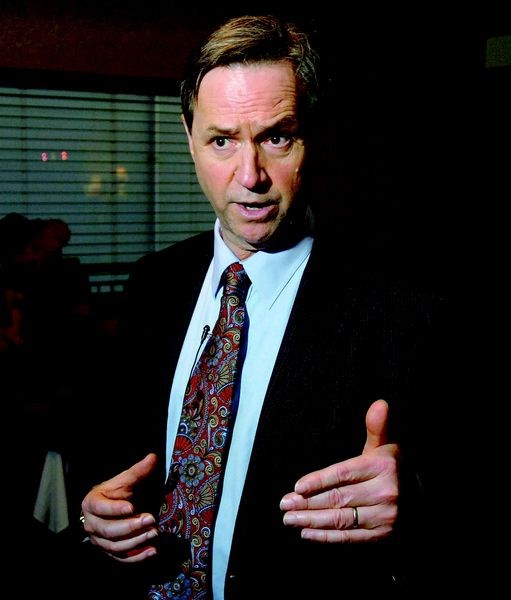George Abbott was in Prince George on Sunday to distinguish himself from the two BC Liberal Party candidates who have been here already and the two who have yet to visit the northern capital.
His centrist scheduling paralleled his moderating viewpoints. He characterized himself as a relationship builder and someone who would put a lot more "public" in public policy.
"I think we have to rebuild trust and confidence in British Columbians and I intend to devote my life in the next two and a half years to show a different style of leadership," he said, promising to keep the windows and doors of government more open than they lately have been. "Hearing and implementing (the public's views) will hopefully help us form government."
Abbott joined politics as a name on the ballot in 1980, when he won a seat on the Columbia-Shuswap Regional District. He held the position of chair for 10 years, acclaimed each time, then in 1990 was elected to Sicamous council.
In 1996 Abbott made the leap to provincial politics, getting elected as MLA for the riding of Shuswap. In opposition that term, Abbott served as critic for municipal affairs and forests.
He was reelected in 2001 (and all subsequent provincial elections) and was immediately made a cabinet minister. He has been a cabinet minister ever since, holding the posts of Minister of Aboriginal Relations and Reconciliation, Minister of Health, Minister of Sustainable Resource Management and Minister of Community, Aboriginal and Women's Services then most recently as Minister of Education. In October he was also tapped as the government's Deputy House Leader.
Abbott was the second candidate in the running for the leadership of the BC Liberals. Rookie MLA Moira Stillwell was the first, and since Abbott confirmed the race was joined by Kevin Falcon, Mike de Jong and Christie Clark, all present or former cabinet colleagues of Abbott's.
"I would be proud to serve in the government of any of the others," Abbott said, drawing a distinction between this race and that of the fractured NDP caucus right now.
"What I bring is 30 years of proven political experience. I have been tested at the local government level and in some of the toughest portfolios in the provincial government. I have succeeded in everything I have taken on."
He is the only one of the candidates so far who has a residential connection to the rural body of B.C. He said the continuation of unlocking the resource economy of the north was the key to the province's fiscal success. Infrastructure like the electrification of Highway 37, highways expansion, a diversified forest sector and a sound mining sector was key, for his vision of a prosperous province.
All of that, he stressed, comes with a two-word addendum: First Nations.
Without clear and honest partnerships with the affected First Nations, little progress could be made in any resource developments. He considered aboriginal relations to be a provincial priority above all others, because they touched all others.
Local MLA John Rustad said his riding of Nechako-Lakes were loaded with the issues that Abbott is centring his leadership bid on, and from his experience in government caucus, Abbott was the one to best able to run an open, effective dialogue with the public, "but I encourage everyone to get to know all of these candidates" as the leadership race came to a head.



